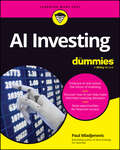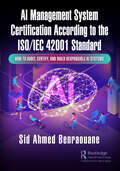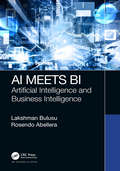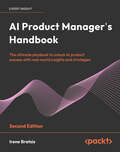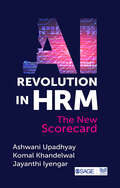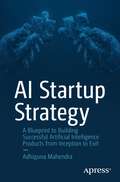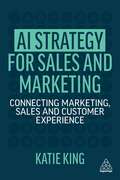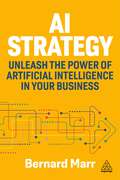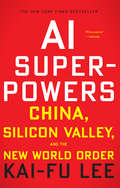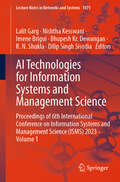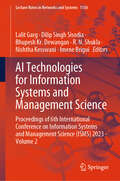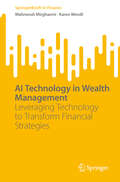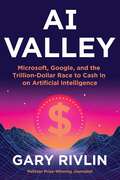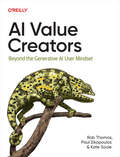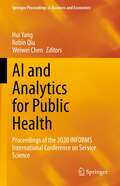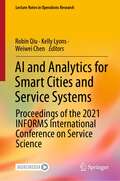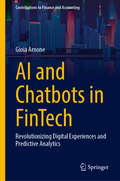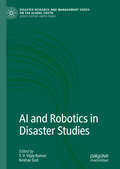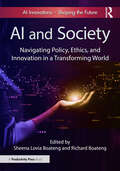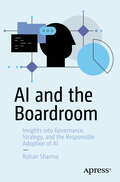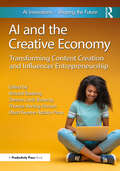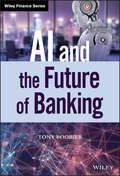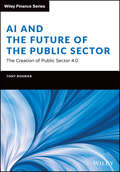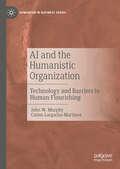- Table View
- List View
AI Investing For Dummies
by Paul MladjenovicWinning strategies for investors looking to boost gains with artificial intelligence AI is one of the hottest investment trends on Wall Street. AI Investing For Dummies gives you all the must-know details on how artificial intelligence can benefit investors. You’ll learn how powerful AI can be in helping you make better decisions, identify hidden opportunities, and build wealth in stocks, bonds, commodities, and real estate. This easy-to-understand Dummies guide also covers budgeting, taxes, estates, and planning for college and retirement—all with AI-specific tactics that can improve efficiency, mitigate risk, and level up your portfolio’s performance. You’ll also find all the info you need to sift through and implement the right resources and solutions for you. Understand the benefits and drawbacks of AI investing Debunk the biggest myths about AI investing Get an in-depth analysis of the top AI stocks to watch Learn how to avoid common pitfalls in AI investing Take a peek at the role of AI in shaping the future of finance This is the ideal Dummies resource for consumers and investors who are new to AI and want to wrap their heads around this emerging technology.
AI Management System Certification According to the ISO/IEC 42001 Standard: How to Audit, Certify, and Build Responsible AI Systems
by Sid Ahmed BenraouaneThe book guides the reader through the auditing and compliance process of the newly released ISO Artificial Intelligence standard. It provides tools and best practices on how to put together an AI management system that is certifiable and sheds light on ethical and legal challenges business leaders struggle with to make their AI system comply with existing laws and regulations, and the ethical framework of the organization.The book is unique because it provides implementation guidance on the new certification and conformity assessment process required by the new ISO Standard on Artificial Intelligence (ISO 42001:2023 Artificial Intelligence Management System) published by ISO in August 2023. This is the first book that addresses this issue.As a member of the US/ISO team who participated in the drafting of this standard during the last 3 years, the author has direct knowledge and insights that are critical to the implementation of the standard. He explains the context of how to interpret ISO clauses, gives examples and guidelines, and provides best practices that help compliance managers and senior leadership understand how to put together the AI compliance system to certify their AI system. The reader will find in the book a complete guide to the certification process of AI systems and the conformity assessment required by the standard. It also provides guidance on how to read the new EU AI Act and some of the U.S. legislations, such as NYC Local Law 144, enacted in July 2023.This is the first book that helps the reader create an internal auditing program that enhances the company’s AI compliance framework. Generative AI has taken the world by storm, and currently, there is no international standard that provides guidance on how to put together a management system that helps business leaders address issues of AI governance, AI structure, AI risk, AI audit, and AI impact analysis. ISO/IEC 42001:2023 is the first international mandatory and certifiable standard that provides a comprehensive and well-integrated framework for the issue of AI governance. This book provides a step-by-step process on how to implement the standard so the AI system can pass the ISO accreditation process.
AI Meets BI: Artificial Intelligence and Business Intelligence
by Lakshman Bulusu Rosendo AbelleraWith the emergence of Artificial Intelligence (AI) in the business world, a new era of Business Intelligence (BI) has been ushered in to create real-world business solutions using analytics. BI developers and practitioners now have tools and technologies to create systems and solutions to guide effective decision making. Decisions can be made on the basis of more reliable and accurate information and intelligence, which can lead to valuable, actionable insights for business. Previously, BI professionals were stymied by bad or incomplete data, poorly architected solutions, or even just outright incapable systems or resources. With the advent of AI, BI has new possibilities for effectiveness. This is a long-awaited phase for practitioners and developers and, moreover, for executives and leaders relying on knowledgeable and intelligent decision making for their organizations. Beginning with an outline of the traditional methods for implementing BI in the enterprise and how BI has evolved into using self-service analytics, data discovery, and most recently AI, AI Meets BI first lays out the three typical architectures of the first, second, and third generations of BI. It then takes an in-depth look at various types of analytics and highlights how each of these can be implemented using AI-enabled algorithms and deep learning models. The crux of the book is four industry use cases. They describe how an enterprise can access, assess, and perform analytics on data by way of discovering data, defining key metrics that enable the same, defining governance rules, and activating metadata for AI/ML recommendations. Explaining the implementation specifics of each of these four use cases by way of using various AI-enabled machine learning and deep learning algorithms, this book provides complete code for each of the implementations, along with the output of the code, supplemented by visuals that aid in BI-enabled decision making. Concluding with a brief discussion of the cognitive computing aspects of AI, the book looks at future trends, including augmented analytics, automated and autonomous BI, and security and governance of AI-powered BI.
AI Product Manager's Handbook: Build, integrate, scale, and optimize products to grow as an AI product manager
by Irene BratsisWhether you're a seasoned professional or a newcomer to the world of AI product management, this is your definitive guide. Embark on a transformative journey into the future of intelligent product management.Key FeaturesChart a successful career path in the AI product management field Packed with real-world examples, practical insights, and actionable strategiesNavigate the complexities of AI product development and evolve your existing products Book DescriptionThis book will provide you with a detailed roadmap for successfully building, maintaining, and evolving artificial intelligence (AI)-driven products, serving as an indispensable companion on your journey to becoming an effective AI PM. We'll explore the AI landscape, demystify complex terms, and walk you through infrastructure, algorithms, and deployment strategies. You’ll master essential skills to understand the optimal flow of AI processes, learn about the product development life cycle from ideation to deployment, and familiarize yourself with commonly used model development techniques. We'll discuss the intricacies of building products natively with AI, as well as evolving traditional software product to AI products. Regardless of your use case, we’ll show you how you can craft compelling stories to captivate your audience. We'll help you find the right balance between foundational product design elements and the unique aspects of managing AI products, so you can prioritize wisely. We’ll also explore career considerations for AI PMs. By the end of this book, you will understand the importance of AI integration and be able to explore emerging AI/ML models like Generative AI and LLMs. You’ll discover open-source capabilities and best practices for ideating, building, and deploying AI products across verticals.What you will learnPlan your AI PM roadmap and navigate your career with clarity and confidenceGain a foundational understanding of AI/ML capabilitiesAlign your product strategy, nurture your team, and navigate the ongoing challenges of cost, tech, compliance, and risk managementIdentify pitfalls and green flags for optimal commercializationSeparate hype from reality and identify quick wins for AI enablement and GenAIUnderstand how to develop and manage both native and evolving AI productsBenchmark product success from a holistic perspectiveWho this book is forThis book is for aspiring and experienced product managers, as well as other professionals interested in incorporating AI into their products. Foundational knowledge of AI is expected and reinforced. If you are looking to better understand machine learning principles and data science methodologies, you will benefit from this book, particularly if you’re in a role where the application of AI/ML directly influences marketing outcomes and business strategies.
AI Revolution in HRM: The New Scorecard
by Ashwani Kumar Upadhyay Komal Khandelwal Jayanthi IyengarWith AI being touted as the new kid on the block, the HR function in organizations is witnessing a sea change with the advent of new data-driven analytical processes. Till now HR has been about employees already working within an organization and potential entrants to it. What happens when machines and bots enter the scene? AI Revolution in HRM is all about debunking the conventional wisdom and redrawing the contours of passé management to include machines into its definition. This book discusses the benefit, challenges and applications of AI in the HR function. It also highlights issues in implementation and considers the impact of AI-based HR systems in the organization. Further, the book provides tips and insights on how to deal with the challenges and implementation issues ranging from data privacy to system bias and up-skilling of current employees. It is builds on a wide variety of cases ranging from large global organizations to startups. This book will ensure that HR professionals and general readers fully understand the concepts of AI and its relevance to the HR profession. Equipped with the knowledge of AI-based tools and systems, it will help the HR department make their organizations more vibrant and stable by embracing the developments in AI technology. AI Revolution in HRM will be an insightful and helpful read for HR professionals and AI enthusiast.
AI Startup Strategy: A Blueprint to Building Successful Artificial Intelligence Products from Inception to Exit
by Adhiguna MahendraGain exclusive access to the secrets to building an enterprise AI start-up. AI innovation helps with every aspect of the business, from the supply chain, marketing, and advertising, customer service, risk management, operations to security. Industries from different verticals have been adopting AI and get real business values out of it. This book guides you through each step, from defining the business need and business model, all the way to registering IP and calculating your AI start-up valuation. You see how to perform market and technology validation, perform lean AI R&D, design AI architecture, AI product development and operationalization. The book also cover building and managing an AI team, along with attracting and keeping business and developer users,Building an Enterprise AI start-up is hard because Enterprise AI is an effort to build applications to mimic human intelligence to solve business problems. Hence it has a different challenge from building traditional non-AI applications, such as scouting, recruiting and managing AI talents; designing the most cost-efficient and scalable Enterprise AI; or establishing the best practice to operationalize AI in productionAs we are in the dawn of the AI-first product wave, AI-powered products for enterprises will be created for many years to come and AI Startup Strategy is the one-stop guide for it.What You'll LearnMatch customer’s expectation VS technical feasibilityJustify business values and ROI for customersReview the best business models for high valuation enterprise AI start-upsDesign an AI product that gives a satisfactory experience for the userRegister and value AI IP Who This Book is For Startup Founders, Product Managers, Software Architects/Lead Engineers, Executives
AI Strategy for Sales and Marketing: Connecting Marketing, Sales and Customer Experience
by Katie KingMarketing and sales prioritize AI and machine learning more than any other business department, yet often struggle with how to scale and strategize the opportunities they present.AI Strategy for Sales and Marketing presents a framework for understanding how AI can boost customer-centricity and sales by creating a connected strategy that delivers value today and into the future. Supported by practical tips and advice throughout, it covers topics including personalization, upskilling, customer experience for both on and offline shopping channels and the importance of using AI responsibly to create consumer trust.Featuring original research and interviews with leading practitioners, it also contains global case studies from organizations in a range of sectors, including Samsung, PwC, Rolls Royce, Deloitte and Hilton, with insights into the various stages of their adoption journeys. Written by a recognized industry expert, it is an invaluable resource for those wanting to benefit from using AI strategically in marketing, sales and CX.
AI Strategy: Unleash the Power of Artificial Intelligence in Your Business
by Bernard MarrIs your business truly ready for the AI revolution? Discover how to unlock the full potential of artificial intelligence and future-proof your organization with a winning AI strategy.AI is transforming every industry - is your business keeping up? In this essential guide, bestselling author and futurist Bernard Marr provides a comprehensive playbook for leaders looking to harness the power of AI. From understanding AI's transformative impact to developing a clear, actionable strategy, this book equips leaders with the tools they need to drive innovation, manage risks, and stay ahead in an AI-driven world.AI Strategy is the definitive guide for leaders ready to unlock AI's potential at scale. Covering every aspect of AI adoption - from ethical considerations and data management to employee upskilling and tech infrastructure - this book delivers real-world examples across multiple organizations and industries, from energy, healthcare and education to marketing and HR. Whether you're just starting or scaling fast, this must-read guide will help you confidently build and execute a winning AI strategy.
AI Superpowers: China, Silicon Valley, and the New World Order
by Kai-Fu LeeDr. Kai-Fu Lee—one of the world’s most respected experts on AI and China—reveals that China has suddenly caught up to the US at an astonishingly rapid and unexpected pace. <P><P>In AI Superpowers, Kai-fu Lee argues powerfully that because of these unprecedented developments in AI, dramatic changes will be happening much sooner than many of us expected. Indeed, as the US-Sino AI competition begins to heat up, Lee urges the US and China to both accept and to embrace the great responsibilities that come with significant technological power. <P><P>Most experts already say that AI will have a devastating impact on blue-collar jobs. But Lee predicts that Chinese and American AI will have a strong impact on white-collar jobs as well. Is universal basic income the solution? <P><P> In Lee’s opinion, probably not. But he provides a clear description of which jobs will be affected and how soon, which jobs can be enhanced with AI, and most importantly, how we can provide solutions to some of the most profound changes in human history that are coming soon. <P><b>A New York Times Bestseller</b>
AI Technologies for Information Systems and Management Science: Proceedings of 6th International Conference on Information Systems and Management Science (ISMS) 2023 - Volume 1 (Lecture Notes in Networks and Systems #1071)
by Lalit Garg Nishtha Kesswani Imene Brigui Dilip Singh Sisodia Bhupesh Kr. Dewangan R. N. ShuklaThis book explores the integration of artificial intelligence into various facets of information systems and management. It delves into machine learning, natural language processing, and computer vision applications, illustrating how these technologies revolutionize decision-making, optimization, and data analysis. Through case studies and theoretical frameworks, the book elucidates the transformative potential of AI in enhancing organizational efficiency and strategic planning, making it an essential reading for professionals and researchers navigating the intersection of AI and business. This book also highlights the efforts to build ethical norms and frameworks for AI adoption in MIS, as well as data privacy and security considerations.
AI Technologies for Information Systems and Management Science: Proceedings of 6th International Conference on Information Systems and Management Science (ISMS) 2023 - Volume 2 (Lecture Notes in Networks and Systems #1136)
by Lalit Garg Nishtha Kesswani Imene Brigui Dilip Singh Sisodia Bhupesh Kr. Dewangan R. N. ShuklaThis text will be replaced by the correct informationtext as soon as we get it.
AI Technology in Wealth Management: Leveraging Technology to Transform Financial Strategies (SpringerBriefs in Finance)
by Karen Wendt Mahnoosh MirghaemiThis book explores AI technology in wealth management, including what it is, how it changes the wealth management and private banking landscape, its advantages, and how it democratizes wealth management. Specifically, this book investigates topics such as Hyper-personalized investment strategies Combined quantitative analysis with sentiment analysis to create prescriptive and predictive scenarios Expandable and transparent AI algorithms in wealth management Customer experience and client engagement Tailored financial content Providing a clear and concise description of how AI driven wealth management differs from traditional investing, asset management, and wealth management offering new opportunities for investing, this book is ideal for students, scholars, researchers and professionals interested in accessible wealth management applications for investing in the 21st century.
AI Valley: Microsoft, Google, and the Trillion-Dollar Race to Cash In on Artificial Intelligence
by Gary RivlinA veteran Pulitzer Prize-winning journalist shadows the top thinkers in the field of Artificial Intelligence, introducing the breakthroughs and developments that will change the way we live and work. Artificial Intelligence has been “just around the corner” for decades, continually disappointing those who long believed in its potential. But now, with the emergence and growing use of ChatGPT, Gemini, and a rapidly multiplying number of other AI tools, many are wondering: Has AI’s moment finally arrived?In AI Valley, Pulitzer Prize-winning journalist Gary Rivlin brings us deep into the world of AI development in Silicon Valley. Over the course of more than a year, Rivlin closely follows founders and venture capitalists trying to capitalize on this AI moment. That includes LinkedIn founder Reid Hoffman, the legendary investor whom the Wall Street Journal once called, “the most connected person in Silicon Valley.”Through Hoffman, Rivlin is granted access to a number of companies on the cutting-edge of AI research, such as Inflection AI, the company Hoffman cofounded in 2022, and OpenAI, the San Francisco-based startup that sparked it all with its release at the end of that year of ChatGPT. In addition to Hoffman, Rivlin introduces us to other AI experts, including OpenAI cofounder Sam Altman and Mustafa Suleyman, the co-founder of DeepMind, an early AI startup that Google bought for $650 million in 2014. Rivlin also brings readers inside Microsoft, Meta, Google and other tech giants scrambling to keep pace.On this vast frontier, no one knows which of these companies will hit it big–or which will flame out spectacularly. In this riveting narrative marbled with familiar names such as Musk, Zuckerberg, and Gates, Rivlin chronicles breakthroughs as they happen, giving us a deep understanding of what’s around the corner in AI development. An adventure story full of drama and unforgettable personalities, AI Valley promises to be the definitive story for anyone seeking to understand the latest phase of world-changing discoveries and the minds behind them.
AI Value Creators
by Rob Thomas Paul Zikopoulos Kate SouleWe've arrived in a new era—GenAI is reshaping industries and decision-making processes across the board. As a result, understanding their potential and pitfalls has become crucial. But in order to stay ahead of the curve, you'll need to develop fresh perspectives on leveraging AI beyond mere technical know-how. Geared toward business leaders and tech professionals alike, this book demystifies the strategic integration of AI into business practices, ensuring you're equipped not just to participate but to lead in this new landscape. This insightful guide by industry leaders Rob Thomas, Paul Zikopoulos, and Kate Soule goes beyond the basics, offering real-life success stories and learned lessons to provide a blueprint for meaningful AI engagement. Whether you're a novice or a seasoned expert, you'll come away with an enhanced understanding of GenAI. Recognize the transformative potential of AI in business and how to harness itNavigate the ethical and operational challenges posed by AI with confidenceUnderstand the dynamic interplay between AI technology and business strategyImplement actionable strategies to integrate AI into your organizational cultureStep confidently into the role of an AI value creator, equipped to lead and innovate
AI and Analytics for Public Health: Proceedings of the 2020 INFORMS International Conference on Service Science (Springer Proceedings in Business and Economics)
by Hui Yang Weiwei Chen Robin QiuThis volume offers the state-of-the-art research and developments in service science and related research, education and practice areas. It showcases emerging technology and applications in fields including healthcare, energy, finance, information technology, transportation, sports, logistics, and public services. Regardless of size and service, a service organization is a service system. Because of the socio-technical nature of a service system, a systems approach must be adopted to design, develop, and deliver services, aimed at meeting end users’ both utilitarian and socio-psychological needs. Effective understanding of service and service systems often requires combining multiple methods to consider how interactions of people, technology, organizations, and information create value under various conditions. Chapters highlight ways to approach such technical challenges in service science and are based on submissions from the 2020 INFORMS International Conference on Service Science.
AI and Analytics for Smart Cities and Service Systems: Proceedings of the 2021 INFORMS International Conference on Service Science (Lecture Notes in Operations Research)
by Weiwei Chen Kelly Lyons Robin QiuThis book showcases state-of-the-art advances in service science and related fields of research, education, and practice. It presents emerging technologies and applications in contexts ranging from healthcare, energy, finance, and information technology to transportation, sports, logistics, and public services. Regardless of its size and service, every service organization is a service system. Due to the socio-technical nature of service systems, a systems approach must be adopted in order to design, develop and deliver services aimed at meeting end users’ utilitarian and socio-psychological needs alike. Understanding services and service systems often requires combining multiple methods to consider how interactions between people, technologies, organizations and information create value under various conditions. The papers in this volume highlight a host of ways to approach these challenges in service science and are based on submissions to the 2021 INFORMS Conference on Service Science.
AI and Chatbots in Fintech: Revolutionizing Digital Experiences and Predictive Analytics (Contributions to Finance and Accounting)
by Gioia ArnoneThis book is a comprehensive guide to the use of Artificial Intelligence (AI) in the Financial Technology (FinTech) industry. It is comprised of ten chapters, each addressing a specific aspect of AI in FinTech. The reader is introduced to AI in FinTech, including its history and current state and the role of chatbots in FinTech and how they are used to improve customer service. Furthermore, the book explores the business framework of AI-based ChatGPT in FinTech, including the technology behind ChatGPT and how it can be applied to various financial sectors. The book examines the use of predictive analytics and machine learning in FinTech, highlighting how these tools are used to predict customer behavior and improve decision-making. The author delves into how ChatGPT is used to determine buying behavior and discusses the use of machine learning to reshape the digital experience in FinTech. Additionally, the book provides best practices for retaining customers in FinTech, including how to use AI to create personalized experiences that keep customers coming back, and explores the different applications of predictive models in FinTech, including how they are used to improve risk management and fraud detection. Lastly, the book discusses the use of ChatGPT for stock price prediction and the detection of financial fraud and examines the role of ChatGPT in the world of cryptocurrency, including how it can be used to make informed investment decisions. Overall, this book provides a comprehensive overview of the different ways AI is being used in FinTech and the potential it holds for improving customer experiences and driving innovation in the financial industry.
AI and Finance in 2019
by Marco Iansiti Aldo Sesia Karim R. Lakhani Marco Di MaggioIndustry and Background Note
AI and Robotics in Disaster Studies (Disaster Research and Management Series on the Global South)
by T. V. Vijay Kumar Keshav SudThis book promotes a meaningful and appropriate dialogue and cross-disciplinary partnerships on Artificial Intelligence (AI) in governance and disaster management. The frequency and the cost of losses and damages due to disasters are rising every year. From wildfires to tsunamis, drought to hurricanes, floods to landslides combined with chemical, nuclear and biological disasters of epidemic proportions has increased human vulnerability and ecosystem sustainability. Life is not as it used to be and governance to manage disasters cannot be a business as usual. The quantum and proportion of responsibilities with the emergency services has increased many times to strain them beyond their human capacities. Its time that the struggling disaster management services get supported and facilitated by new technology of combining Artificial Intelligence (AI) and Machine Learning (ML) with Data Analytics Technologies (DAT)to serve people and government in disaster management. AI and ML have advanced to a state where they could be utilized for many operations in disaster risk reduction. Even though many disasters cannot be prevented and a number of them are blind natural disasters yet through an appropriate application of AI and ML quick predictions, vulnerability identification and classification of relief and rescue operations could be achieved.
AI and Society: Navigating Policy, Ethics, and Innovation in a Transforming World
by Richard Boateng Sheena Lovia BoatengIn recent years, the profound impact of artificial intelligence (AI) on fostering new forms of entrepreneurship has become increasingly evident. Entrepreneurs worldwide are harnessing the capabilities of AI to develop innovative solutions and create businesses that address pressing challenges.Despite the growing recognition of AI’s potential, there exists a crucial need to deepen understanding and awareness surrounding how individuals are leveraging AI to establish novel ventures. Many entrepreneurs are pioneering initiatives that deploy AI technologies to tackle complex problems. This challenge revolves around the imperative to explore, document, and comprehend the diverse ways in which AI is driving the emergence of new businesses, solving real-world problems, and reshaping the entrepreneurial landscape. It underscores the necessity for entrepreneurs, researchers, and the wider community to grasp the transformative role of AI in fostering innovation and enabling the creation of businesses dedicated to addressing societal issues. Addressing this challenge will contribute to a more comprehensive understanding of the synergy between AI and entrepreneurship, paving the way for informed and impactful ventures that leverage the full potential of AI technologies.This book addresses the broader societal implications of AI, focusing on policy, education, and ethical considerations. It reviews national AI policies in Africa, explores AI-powered innovation in STEM education, and investigates the use of AI in fraudulent activities. It also discusses the integration of AI in the transport sector of developing countries, highlighting its potential to revolutionize infrastructure and services. In addition, it provides a holistic view of AI’s impact on society, emphasizing the need for ethical guidelines, regulatory frameworks, and continuous learning to harness AI responsibly. In a comparative analysis, it presents an exploration into the landscape of top-rated AI freelancers across Europe, North America, and South America, focusing on the intersection of gender and professional success in this burgeoning sector. It concludes with a discussion on the role of AI in the future of accounting in emerging economies.
AI and the Boardroom: Insights into Governance, Strategy, and the Responsible Adoption of AI
by Rohan SharmaDevelop and implement AI strategies aligned with business goals, including operating models and partnership strategies. This book is practical guide for chief experience officers and other corporate board members faced with the complex issues of AI governance, data privacy, AI regulations, AI copyright, AI strategy, and more. Executives are eager to hear from other executives, peers, and authority figures regarding AI matters, and how to approach them quickly, correctly and meaningfully. The cost of missing out or messing up in AI transformation is easy so it’s imperative that C-suite and board members have the right mental framework to ask the right questions for their organizations. Throughout this book, you’ll see how to develop and execute AI strategies that align with your organizational goals and ethical standards. You’ll navigate the complex landscape of AI regulation and governance, applying best practices to ensure compliance and protect stakeholder interests. You’ll also, understand how to innovate and adapt AI technologies within your operations. AI and the Boardroom provides all the right tools to guide decision-making, foster partnerships, and enhance customer experiences What You Will Learn Master AI governance, regulations, and ethical considerations, including privacy and intellectual property issues. Optimize AI investments, budgets, and ROI through effective KPIs, OKRs, and risk management. Navigate organizational changes brought by AI, including executive compensation, team structures, and change management. Leverage AI for board-level decision-making while advancing organizational AI maturity and staying ahead of emerging trends. Who This Book Is For Suite executives and corporate board members; technology and innovation leaders; risk management and compliance professionals; corporate strategists and business unit leaders; AI program managers and data scientists
AI and the Creative Economy: Transforming Content Creation and Influencer Entrepreneurship
by Richard Boateng Thomas Anning-Dorson Sheena Lovia Boateng Obed Kwame Adzaku PenuIn recent years, the profound impact of artificial intelligence (AI) on fostering new forms of entrepreneurship has become increasingly evident. Entrepreneurs worldwide are harnessing the capabilities of AI to develop innovative solutions and create businesses that address pressing challenges.Despite the growing recognition of AI’s potential, there exists a crucial need to deepen understanding and awareness surrounding how individuals are leveraging AI to establish novel ventures. Many entrepreneurs are pioneering initiatives that deploy AI technologies to tackle complex problems. This challenge revolves around the imperative to explore, document, and comprehend the diverse ways in which AI is driving the emergence of new businesses, solving real-world problems, and reshaping the entrepreneurial landscape. It underscores the necessity for entrepreneurs, researchers, and the wider community to grasp the transformative role of AI in fostering innovation and enabling the creation of businesses dedicated to addressing societal issues. Addressing this challenge will contribute to a more comprehensive understanding of the synergy between AI and entrepreneurship, paving the way for informed and impactful ventures that leverage the full potential of AI technologies.In this respect, the purpose of this book is to offer an in-depth exploration of the intersection between AI and entrepreneurial ventures. The book aims to provide a contemporary and thorough analysis of how AI is playing a pivotal role in shaping new forms of entrepreneurship across various industries. It seeks to illuminate the ways in which entrepreneurs are leveraging AI technologies to drive innovation, address challenges, and create businesses that contribute to societal progress.Focusing on the intersection of AI and the creative economy, this book examines the role of AI in content creation, social media, and influencer entrepreneurship. It provides a snapshot of current research, identifies gaps in knowledge, and presents case studies of content creators who have successfully integrated AI into their workflows. This book highlights the impact of AI on various forms of content creation, including educational, lifestyle, health, and entertainment content. It also includes a comprehensive syllabus for training entrepreneurs on leveraging AI for content creation, emphasizing the balance between technological advancements and maintaining authenticity.
AI and the Future of Banking (Wiley Finance)
by Tony BoobierAn industry-specific guide to the applications of Advanced Analytics and AI to the banking industry Artificial Intelligence (AI) technologies help organisations to get smarter and more effective over time – ultimately responding to, learning from and interacting with human voices. It is predicted that by 2020, half of all businesses will be using these intelligent, self-learning systems. Across its entire breadth and depth, the banking industry is at the forefront of investigating Advanced Analytics and AI technology for use in a broad range of applications, such as customer analytics and providing wealth advice for clients. AI and the Future of Banking provides new and established banking industry professionals with the essential information on the implications of data and analytics on their roles, responsibilities and personal career development. Unlike existing books on the subject which tend to be overly technical and complex, this accessible, reader-friendly guide is designed to be easily understood by any banking professional with limited or no IT background. Chapters focus on practical guidance on the use of analytics to improve operational effectiveness, customer retention and finance and risk management. Theory and published case studies are clearly explained, whilst considerations such as operating costs, regulation and market saturation are discussed in real-world context. Written by a recognised expert in AI and Advanced Analytics, this book: Explores the numerous applications for Advanced Analytics and AI in various areas of banking and finance Offers advice on the most effective ways to integrate AI into existing bank ecosystems Suggests alternative and complementary visions for the future of banking, addressing issues like branch transformation, new models of universal banking and ‘debranding’ Explains the concept of ‘Open Banking,’ which securely shares information without needing to reveal passwords Addresses the development of leadership relative to AI adoption in the banking industry AI and the Future of Banking is an informative and up-to-date resource for bank executives and managers, new entrants to the banking industry, financial technology and financial services practitioners and students in postgraduate finance and banking courses.
AI and the Future of the Public Sector: The Creation of Public Sector 4.0 (Wiley Finance)
by Tony BoobierDiscover how data, analytics, and AI will transform public services for the better In AI and the Future of the Public Sector: The Creation of Public Sector 4.0, renowned executive and consultant Tony Boobier delivers a comprehensive reference of the most relevant and central issues regarding the adoption and implementation of AI in the public sector. In the book, you&’ll find out why data and analytics are the solution to significant and ongoing problems in the public service relating to its ability to effectively provide services in an environment of reduced funding. You&’ll also discover the likely impact of future technological developments, like 5G and quantum computing, as well as explore the future of healthcare and the effective digitalization of the healthcare industry. The book also offers: Discussions of policing 4.0 and how data and analytics will transform public safety Explorations of the future of education and how ai can dramatically enhance educational standards while reducing costs Treatments of the internationalization of public services and its impact on agencies and departments everywhereA can&’t-miss resource for public sector employees at the managerial and professional levels, AI and the Future of the Public Sector is an insightful and timely blueprint to the effective use of artificial intelligence that belongs in the bookshelves of policy makers, academics, and public servants around the world.
AI and the Humanistic Organization: Technology and Barriers to Human Flourishing (Humanism in Business Series)
by John W. Murphy Carlos Largacha-MartinezMany workers already report that they are alienated from their jobs and find their workplaces to be stifling or uninviting and expect that the introduction of new technologies, including AI, will only worsen their organizational culture. This book outlines the need for a humane and responsible approach to technology, so that employees are not further disengaged from the workplace. This shift in approach should mean that when AI is introduced into an organization, workers have a central role in the design, implementation, and evaluation of this technology. Computer technology can thus promote human flourishing instead of contributing to alienation and security in workplaces. This book is a throwback to a time when high theory was an important part of discussions about computer technology. It brings together diverse disciplines to interrogate some important issues facing the development and application of AI, ultimately concluding that this technology is currently being guided by the wrong theory and a humanistic perspective is needed to access its full potential. The ideas presented will be of great interest to scholars and students of AI who focus on the workplace, organizational behavior, and business ethics.
